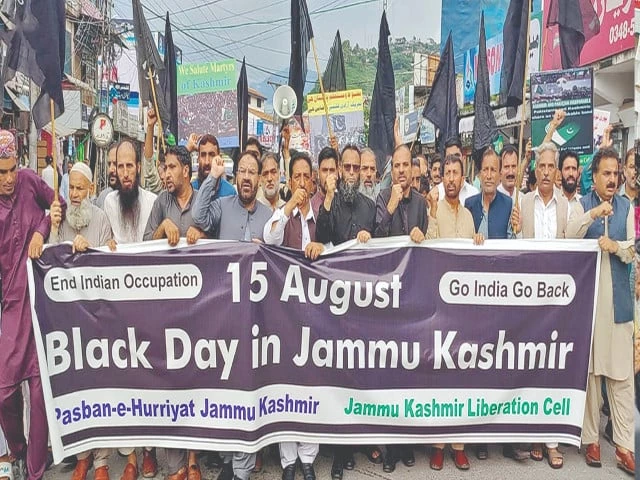Islamabad:
The purse on both sides of the control line (LOC) and from around the world marked on the 78th Independence Day of India on Friday as Black Day, organizing protests and demonstrations to denounce the forced and illegal occupation of Jammu and Kashmir of New Delhi.
The coordinated observance, called by the Hurriyat Conference of all parties (APHC) and backed by Pro -Freedom groups, was developed under radical restrictions in Iiojk and in the context of high tensions between India and Pakistan.
Srinagar reports described an unprecedented security presence, with heavily armed troops patrolling streets, control points and blocking key intersections.
The authorities, which fear large -scale demonstrations in support of Pakistan and against the Indian government, imposed intensified movement and surveillance restrictions. The whole city feels like a strength. Even small meetings are being dispersed, said media reports.
According to ABHC leaders, repression is part of a long data strategy to “suppress peaceful political dissent” in the region.
“Black Day is a reminder for the world that the Kashmir dispute remains unsolved and our self -determination demand is not negotiable,” said an APHC spokesman in a statement.
The observance extended far beyond the valley. In cities, including London, Brussels, Washington DC and Toronto, the communities of the Cashmiro diaspora and its followers organized demonstrations that carried black flags, posters and banners that ask for the end of the Indian occupation.
The protesters said that the demonstrations aimed to break the international silence on human rights abuses in IIOJK and press for a United Nations supervised plebiscite.
Pakistan’s political leadership also marked the day with statements that reaffirmed solidarity with the people of Kashmir. The annual observance of the Black Day dates back to October 27, 1947: the day the Indian troops entered the former princely state of Jammu and Kashmira after their illegal adhesion to India.




